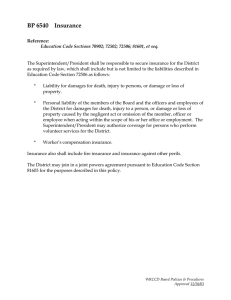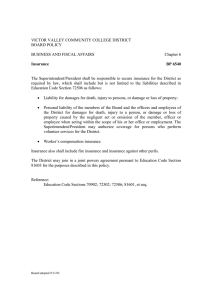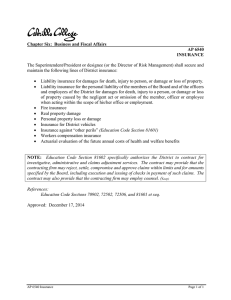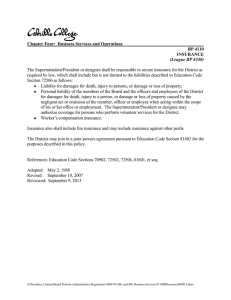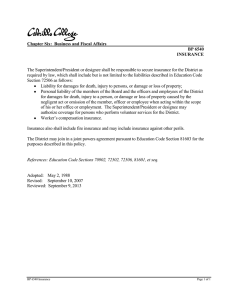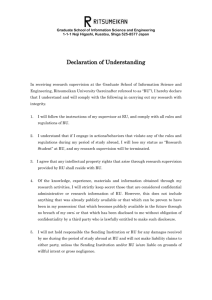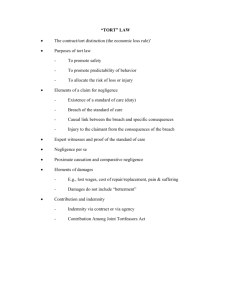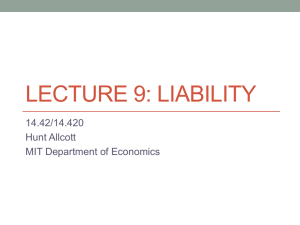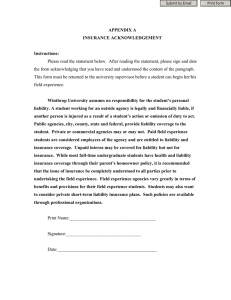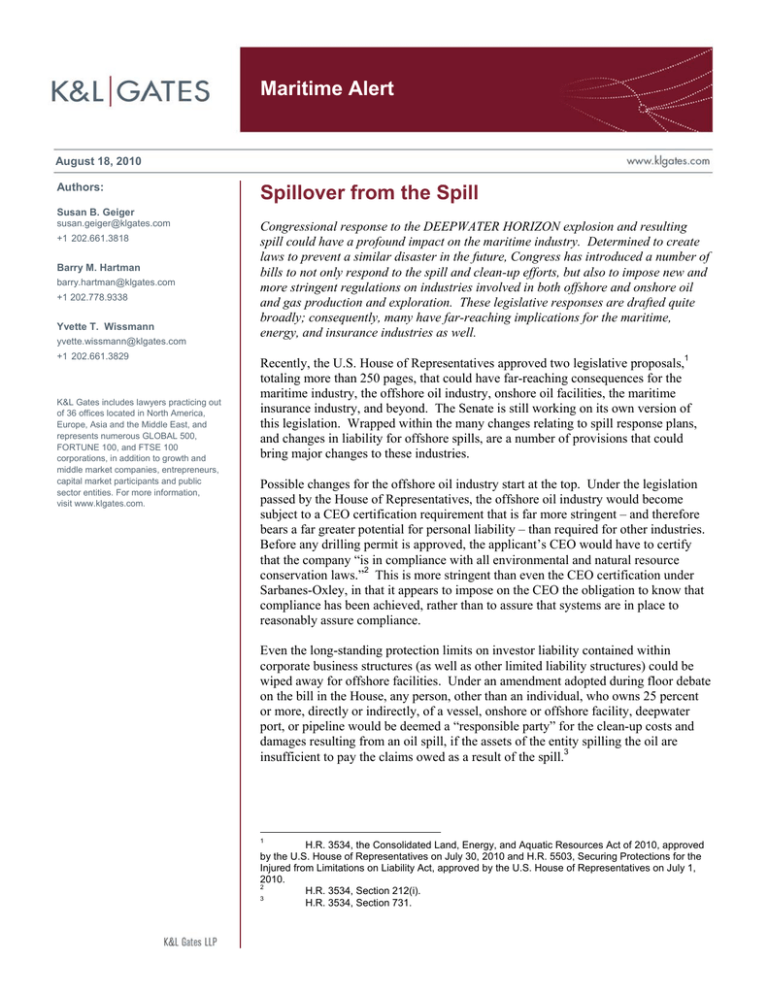
Maritime Alert
August 18, 2010
Authors:
Spillover from the Spill
Susan B. Geiger
susan.geiger@klgates.com
+1 202.661.3818
Barry M. Hartman
barry.hartman@klgates.com
+1 202.778.9338
Yvette T. Wissmann
yvette.wissmann@klgates.com
+1 202.661.3829
K&L Gates includes lawyers practicing out
of 36 offices located in North America,
Europe, Asia and the Middle East, and
represents numerous GLOBAL 500,
FORTUNE 100, and FTSE 100
corporations, in addition to growth and
middle market companies, entrepreneurs,
capital market participants and public
sector entities. For more information,
visit www.klgates.com.
Congressional response to the DEEPWATER HORIZON explosion and resulting
spill could have a profound impact on the maritime industry. Determined to create
laws to prevent a similar disaster in the future, Congress has introduced a number of
bills to not only respond to the spill and clean-up efforts, but also to impose new and
more stringent regulations on industries involved in both offshore and onshore oil
and gas production and exploration. These legislative responses are drafted quite
broadly; consequently, many have far-reaching implications for the maritime,
energy, and insurance industries as well.
Recently, the U.S. House of Representatives approved two legislative proposals,1
totaling more than 250 pages, that could have far-reaching consequences for the
maritime industry, the offshore oil industry, onshore oil facilities, the maritime
insurance industry, and beyond. The Senate is still working on its own version of
this legislation. Wrapped within the many changes relating to spill response plans,
and changes in liability for offshore spills, are a number of provisions that could
bring major changes to these industries.
Possible changes for the offshore oil industry start at the top. Under the legislation
passed by the House of Representatives, the offshore oil industry would become
subject to a CEO certification requirement that is far more stringent – and therefore
bears a far greater potential for personal liability – than required for other industries.
Before any drilling permit is approved, the applicant’s CEO would have to certify
that the company “is in compliance with all environmental and natural resource
conservation laws.”2 This is more stringent than even the CEO certification under
Sarbanes-Oxley, in that it appears to impose on the CEO the obligation to know that
compliance has been achieved, rather than to assure that systems are in place to
reasonably assure compliance.
Even the long-standing protection limits on investor liability contained within
corporate business structures (as well as other limited liability structures) could be
wiped away for offshore facilities. Under an amendment adopted during floor debate
on the bill in the House, any person, other than an individual, who owns 25 percent
or more, directly or indirectly, of a vessel, onshore or offshore facility, deepwater
port, or pipeline would be deemed a “responsible party” for the clean-up costs and
damages resulting from an oil spill, if the assets of the entity spilling the oil are
insufficient to pay the claims owed as a result of the spill.3
1
H.R. 3534, the Consolidated Land, Energy, and Aquatic Resources Act of 2010, approved
by the U.S. House of Representatives on July 30, 2010 and H.R. 5503, Securing Protections for the
Injured from Limitations on Liability Act, approved by the U.S. House of Representatives on July 1,
2010.
2
H.R. 3534, Section 212(i).
3
H.R. 3534, Section 731.
Maritime Alert
All “responsible parties” are required to provide
financial assurance of their ability to pay and
provide a spill control plan before undertaking the
regulated activity and are exposed to penalties for
failure to do so. The bill, however, deems minority
owners responsible based on facts that arise only
after a spill occurs, but does not excuse the
preexisting financial assurance and spill plan
requirements, raising serious questions regarding
how this provision will be implemented.
Another provision in the House legislation affects
any entity that spills oil and causes natural resource
damages. Natural resource damages are paid to
trustees of resources and are different from, and in
addition to, economic losses suffered by private
entities from the loss of those resources. Under
current law, the government’s assessment of natural
resource damages is entitled to a “rebuttable
presumption” that it is correct in any subsequent suit
brought under the Oil Pollution Act for natural
resource damages.4 This evidentiary presumption
can be rebutted by new evidence introduced at a trial
that the assessment is flawed. Under section 706 of
the House bill, the natural resource damage
assessment developed by the lead trustee may only
be challenged under the Administrative Procedures
Act, where the only basis for the challenge is that the
assessment is arbitrary, capricious and inconsistent
with law. This provision would likely not permit the
introduction of new evidence of those damages at a
subsequent trial. Further, this provision could also
impact private economic damage claims based on
those lost resources. This will create extraordinary
pressure on private parties to participate in the
natural resource damage assessment process, which
is controlled by the trustees.
In addition to the provision that greatly narrows the
opportunity to challenge the government natural
resource damage assessment, the House amendment
to section 1006(d) could substantially increase
natural resource damage costs. Under current law,
there is no specific requirement that any of the
remedies for addressing natural resource damages restoration, rehabilitation, replacement or acquisition
of replacement resources, is preferred. Under
regulations governing natural resource damages,
4
15 C.F.R. § 990.13.
restoration includes natural restoration. The
regulations do provide for evaluation of the various
options (restoration, acquisition, rehabilitation or
replacement) based on a number of factors, and all
other things being equal, the most cost effective one
is to be chosen.5 There is often a battle over
whether natural recovery, which is the most cost
effective, should be chosen. Under the House bill, it
appears that the discretion to choose the most cost
effective alternative may have been eliminated and
the discretion to choose acquisition of replacement
resources (often the second least expensive option)
is only permitted if the substitute resource can
provide “substantially greater likelihood of
improving the resilience of the lost resource and
supports local ecological processes.” This appears
to be a standard that would discourage this
alternative.
Tackling one of the most politically sensitive issues
relating to liability, the House bill eliminates any
limit on liability for an oil spill by an offshore
facility. Liability for clean-up and removal costs
would remain unlimited, as it is under current law,
but liability for damages, whether from a vessel or a
facility, is currently subject to a potential cap,
assuming certain conditions are met. While creating
this unlimited liability regime, the House bill retains
the requirement that entities provide certificates of
financial assurance, and while those amounts are
significantly increased under the bill, they are not
unlimited. Subjecting the offshore industry to
unlimited liability for damages has been a
particularly difficult issue in the Senate. An
alternative proposal that would involve a shared
liability scheme, much like the way in which
nuclear power plants are insured, is being
considered as an alternative approach. .6
Another major change for the maritime industry
would be created by provisions in the House bill
that would require all activities on the Exclusive
5
15 C.F.R. 990.54.
The Senate is aware that there needs to be
consistency between financial assurance and liability
provisions. See, Testimony of Barry M. Hartman before the
Senate Environmental and Public works, Committee, June 9,
2010;
http://epw.senate.gov/public/index.cfm?FuseAction=Hearings.
Hearing&Hearing_ID=fdf49728-802a-23ad-40c642b02815d1e5.
6
August 18, 2010
2
Maritime Alert
Economic Zone to be subject to U.S.-flag
requirements. This provision would affect not only
rigs but all of the various types of vessels supporting
that industry or simply conducting operations within
the zone. The House bill would require vessels to
be: (1) under U.S.-flag registry; (2) owned by an
entity that is at least 75 percent owned by U.S.
citizens; and (3) built in the United States. Foreignowned vessels and companies would no longer be
able to operate within the zone. The Obama
Administration has noted its concern with the
implications of this provision on international trade.
Among many other provisions of the House
legislation are provisions that would require
substantial changes to oil spill response plans,
including requiring redundancy plans and vetting by
impartial experts, expansion of the damages for
which a responsible party is liable to include
damages to human health, including mental health,
and the expansion of removal costs, for which there
is no limit on liability, to include all costs of federal
enforcement activities relating to removal costs.
As a result of the deaths from the explosion of the
rig, expanding liability for personal injury and death
has also been passed by the House (H.R. 5503).
Amendments to the Jones Act, the Death on the
High Seas Act, and the Limitation of Shipowners’
Liability Act are included in the House-passed bill
and similar provisions are being considered by the
Senate. These amendments would open up these
liability schemes for punitive damages and other
non-pecuniary damages, potentially resulting in
major changes for owners’ liability and costs.
Whether any or all of these changes will be
incorporated into any final bill passed by Congress
and approved by the President remains to be seen.
Congress remains under political pressure to “do
something” about the spill and its aftermath, making
it certain that oil spill legislation will remain on the
agenda following the August recess. The impact of
these changes could be substantial. In 1990, the Oil
Pollution Act focused on vessels because it was
largely a response to the Exxon Valdez spill. Other
sectors involved in production of oil were carried
along with this wave of reform. The current effort
may well have the same impact on the maritime
industry, and others, beyond deepwater offshore
drilling. Affected industries need to make their
voices heard in this process.
Anchorage Austin Beijing Berlin Boston Charlotte Chicago Dallas Dubai Fort Worth Frankfurt Harrisburg Hong Kong London
Los Angeles Miami Moscow Newark New York Orange County Palo Alto Paris Pittsburgh Portland Raleigh Research Triangle Park
San Diego San Francisco Seattle Shanghai Singapore Spokane/Coeur d’Alene Taipei Tokyo Warsaw
Washington, D.C.
K&L Gates includes lawyers practicing out of 36 offices located in North America, Europe, Asia and the Middle East, and represents numerous
GLOBAL 500, FORTUNE 100, and FTSE 100 corporations, in addition to growth and middle market companies, entrepreneurs, capital market
participants and public sector entities. For more information, visit www.klgates.com.
K&L Gates comprises multiple affiliated entities: a limited liability partnership with the full name K&L Gates LLP qualified in Delaware and
maintaining offices throughout the United States, in Berlin and Frankfurt, Germany, in Beijing (K&L Gates LLP Beijing Representative Office), in
Dubai, U.A.E., in Shanghai (K&L Gates LLP Shanghai Representative Office), in Tokyo, and in Singapore; a limited liability partnership (also named
K&L Gates LLP) incorporated in England and maintaining offices in London and Paris; a Taiwan general partnership (K&L Gates) maintaining an
office in Taipei; a Hong Kong general partnership (K&L Gates, Solicitors) maintaining an office in Hong Kong; a Polish limited partnership (K&L
Gates Jamka sp.k.) maintaining an office in Warsaw; and a Delaware limited liability company (K&L Gates Holdings, LLC) maintaining an office in
Moscow. K&L Gates maintains appropriate registrations in the jurisdictions in which its offices are located. A list of the partners or members in each
entity is available for inspection at any K&L Gates office.
This publication is for informational purposes and does not contain or convey legal advice. The information herein should not be used or relied upon
in regard to any particular facts or circumstances without first consulting a lawyer.
©2010 K&L Gates LLP. All Rights Reserved.
August 18, 2010
3

